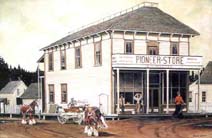
The Grange is a family, community organization with its roots in agriculture. Founded in 1867, the Grange was formed as a national organization with a local focus. Our members are given the opportunity to learn and grow to their full potential as citizens and leaders.
The family is the base of the organization with full membership beginning at age 14. Women have been equal members since the inception of the Grange. We have a Junior Grange program for children age 5 to 14, that has helped the youngest members of the family learn about community values and citizenship for more than 100 years. Our Grange Youth program develops the leadership skills of our young adults and young married couples.
The foundation of the organization is the Community Grange, which can be found in rural, suburban and urban communities. Faith, hope, charity, and fidelity are the basic lessons of the Community Grange. To learn more, see the Declaration of Purposes.
The Grange has four levels, Community, County or District, State, and National to ensure that the membership’s voice is heard at the appropriate place. Our membership sets the direction and activities for their Community Grange in true grassroots fashion, and those decisions advance to the national level. Nonpartisan legislative advocacy, educational programs, service projects, and social interaction and networking are just a few of the ways local Granges serve their communities and members.
Programs for the Family and Community

For more than a century, the Grange has offered programs for the whole family, including Junior Grange for children ages 4 through 13. Children involved with the Junior Grange program become more aware of their community and the world, agriculture, service and citizenship.
Full National Grange membership with voting rights and the ability to hold office begins at age 14, and Grange Youth supports those members ages 14 through 35. All Grange activities support members’ personal growth. Individuals involved in Junior Grange and Grange Youth attend camps, leadership seminars, compete in contests designed to foster a wide range of skills and abilities.
Every year, Grange members give thousands of hours to volunteer in their communities and raise millions of dollars for important causes. Grangers attend public meetings, inform themselves of local, state and national issues, and speak for the rights of all Americans, especially those who work in agriculture, producing our food, fuel and fiber.
Each November, members from across the country gather for the National Grange Annual Convention at which policies, adopted in community Granges, passed by State Granges and moved to the national delegate body, are debated. A true grassroots organization, those policies that pass at convention become the issues for which the National Grange advocates.
The Grange has been instrumental in bringing about avenues for rural access from rural mail delivery to electricity; supporting social reform including women’s suffrage; and assisting groups such as the deaf and hard-of hearing through financial contributions and awareness campaigns.
Want to learn more? Continue reading about us or stop by a local Grange meeting and meet the proud members in your community
WHAT IS THE GRANGE?
The Grange is America’s oldest farm-based fraternal organization. We are a non-partisan, grassroots advocacy group for rural citizens with both legislative programs and community activities such as talent and craft contests, scholarships, youth programs and camps, and much more.
Established in Washington, D.C., in 1867, the National Grange consists of 3,878 Subordinate (local) Granges in 37 states with more than 300,000 members.
THE GRANGE COMES TO WASHINGTON!
There were Granges in Washington Territory long before statehood was gained. In 1873 several were organized in the Walla Walla area, including Waitsburg Grange No. 1 which is still an active Grange. These local (“subordinate”) Granges were under the jurisdiction of the Oregon State Grange.
Organization of the Washington State Grange preceded by just two months the admission of Washington Territory to statehood. There was a direct relationship between the two events. The farmers of the territory were deeply troubled by some provisions in the proposed state constitution. Their concern resulted in the organization of a number of new subordinate Granges, enabling them to form a state Grange and speak out with a stronger voice.

Birthplace of the Washington State Grange was in Camas, Washington in 1889
A lodge room on the upper floor of the Pioneer Store building in La Camas (now Camas) in Clark County was the birthplace of what is now the largest state Grange in the nation. There, on Sept. 10, 1889, delegates and visitors assembled, and the Washington State Grange was organized. During the three-day session, delegates elected and installed officers, conducted other necessary business, and adopted strong resolutions setting forth the farmers’ views on the proposed constitution.
The first Grange in Washington state was Waitsburg Grange No. 1, near Walla Walla, organized in 1873. The first Pomona (county-wide) Grange was established in Clark County in 1902.
The Washington State Grange coordinates the activities of the state’s 293 subordinate Granges and the 41 Pomona (county and district) Granges. Washington enjoys the distinction of having more Grangers than any other state — currently approaching 50,000 members.
